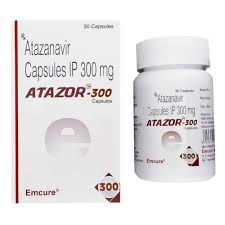Atazor is a medication that contains Atazanavir, which is a protease inhibitor used in the treatment of HIV (Human Immunodeficiency Virus) infection. Below is a detailed overview of Atazor, including its uses, mechanism of action, dosage, side effects, and recommendations.
Composition
- Active Ingredient:
- Atazanavir
- Strength: Typically available in 200 mg tablet form.
Uses
- HIV Treatment: Atazor is indicated for the treatment of HIV-1 infection in adults and children. It is usually used as part of a combination antiretroviral therapy (ART) regimen to reduce viral load, improve immune function, and prevent the progression to AIDS.
Mechanism of Action
- Protease Inhibitor: Atazanavir works by inhibiting the HIV protease enzyme, which is essential for the processing of viral proteins required for the assembly of new viral particles. By preventing the maturation of the virus, Atazanavir stops viral replication.
Dosage
- Adults:
- The typical starting dosage for adults is usually 300 mg taken orally once daily with food. In some cases, especially in patients who may be taking other medications, a lower dose of 200 mg taken once daily may be prescribed, but this is commonly used with a booster dose of Ritonavir.
- Pediatric Patients:
- The dosage for children is based on weight and should be determined by a healthcare provider based on specific dosing guidelines.
Side Effects
Common side effects may include:
- Gastrointestinal Issues: Nausea, diarrhea, and abdominal pain.
- Fatigue: General feelings of tiredness or weakness.
- Rash: Mild skin rashes may occur but should be monitored.
- Headache: A common complaint.
- Elevated Bilirubin Levels: Atazanavir can cause increases in bilirubin levels, leading to jaundice (yellowing of the skin or eyes) in some patients.
Serious Side Effects (Seek Medical Attention Immediately)
- Severe Allergic Reactions: Symptoms may include difficulty breathing, swelling of the face, lips, or throat.
- Severe Skin Reactions: Such as Stevens-Johnson syndrome or toxic epidermal necrolysis (though rare).
- Liver Problems: Symptoms may include jaundice, dark urine, and severe abdominal pain.
- Cardiovascular Issues: Atazanavir can affect heart rhythms, and monitoring may be necessary in some patients.
Recommendations
- Adherence: It is crucial to take Atazor exactly as prescribed to maintain effective viral suppression and minimize the risk of drug resistance.
- Take with Food: Taking Atazanavir with food can enhance its absorption and reduce gastrointestinal side effects.
- Regular Monitoring: Schedule regular follow-up appointments with your healthcare provider to monitor liver function, bilirubin levels, viral load, and overall health.
- Management of Side Effects: Report any severe or unusual side effects to your healthcare provider immediately.
- Healthy Lifestyle: Maintain a balanced diet, engage in regular exercise, and avoid excessive alcohol consumption to support overall health.
- Inform About Other Medications: Always inform your healthcare provider about any other medications, supplements, or herbal products you are taking to avoid potential interactions.
Important Notes
- Atazor is typically used as part of a comprehensive HIV treatment regimen and should not be used alone.
- Discuss any concerns regarding treatment, potential interactions, or side effects with your healthcare provider.
If you have any specific questions or need further information about Atazor (Atazanavir), feel free to ask!




Reviews
There are no reviews yet.